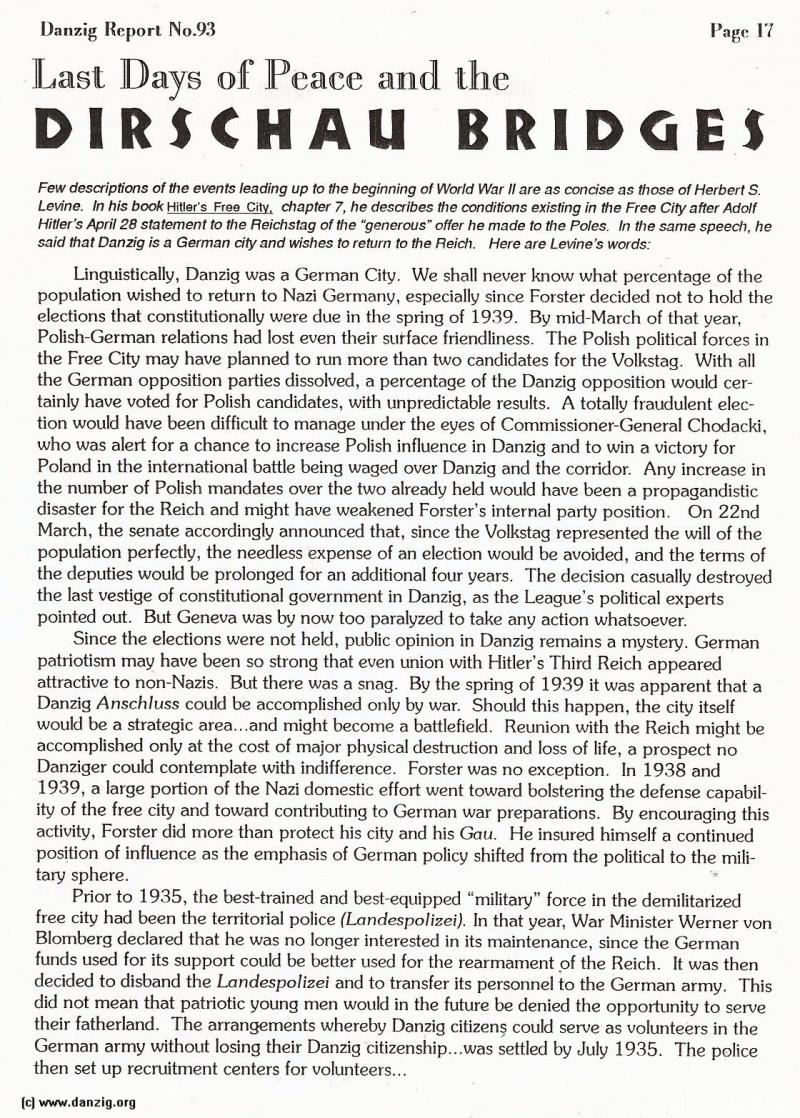
Last Days of Peace and the DIRSCHAU BRIDGES
Few descriptions of the events leading up to the beginning of World War II are as concise as those of Herbert S. Levine. In his book Hitler’s Free City. chapter 7, he describes the conditions existing in the Free City after Adolf Hitler’s April28 statement to the Reichstag of the “generous” offer he made to the Poles. In the same speech, he said that Danzig is a German city and wishes to return to the Reich. Here are Levine’s words:
Linguistically, Danzig was a German City. We shall never know what percentage of the population wished to return to Nazi Germany, especially since Forster decided not to hold the elections that constitutionally were due in the spring of 1939. By mid-March of that year, Polish-German relations had lost even their surface friendliness. The Polish political forces in the Free City may have planned to run more than two candidates for the Volkstag. With all the German opposition parties dissolved, a percentage of the Danzig opposition would cert ainly have voted for Polish candidates, with unpredictable results. A totally fraudulent elect ion would have been difficult to manage under the eyes of Commissioner-General Chodacki, who was alert for a chance to increase Polish influence in Danzig and to win a victory for Poland in the international battle being waged over Danzig and the corridor. Any increase in the number of Polish mandates over the two already held would have been a propagandistic disaster for the Reich and might have weakened Forster’s internal party position. On 22nd March, the senate accordingly announced that, since the Volkstag represented the will of the population perfectly, the needless expense of an election would be avoided, and the terms of the deputies would be prolonged for an additional four years. The decision casually destroyed the last vestige of constitutional government in Danzig, as the League’s political experts pointed out. But Geneva was by now too paralyzed to take any action whatsoever.
Since the elections were not held, public opinion in Danzig remains a mystery. German patriotism may have been so strong that even union with Hitler’s Third Reich appeared attractive to non-Nazis. But there was a snag. By the spring of 1939 it was apparent that a Danzig Anschluss could be accomplished only by war. Should this happen, the city itself would be a strategic area.. .and might become a battlefield. Reunion with the Reich might be accomplished only at the cost of major physical destruction and loss of life, a prospect no Danziger could contemplate with indifference. Forster was no exception. In 1938 and 1939, a large portion of the Nazi domestic effort went toward bolstering the defense capabili ty of the free city and toward contributing to German war preparations. By encouraging this activity, Forster did more than protect his city and his Gau. He insured himself a continued position of influence as the emphasis of German policy shifted from the political to the milit ary sphere.
Prior to 1935, the best-trained and best-equipped “military” force in the demilitarized free city had been the territorial police (Landespolizei). In that year, War Minister Werner von Blomberg declared that he was no longer interested in its maintenance, since the German funds used for its support could be better used for the rearmament of the Reich. It was then decided to disband the Landespolizei and to transfer its personnel to the German army. This did not mean that patriotic young men would in the future be denied the opportunity to serve their fatherland. The arrangements whereby Danzig citizens could serve as volunteers in the German army without losing their Danzig citizenship.. .was settled by July 1935. The police then set up recruitment centers for volunteers...
Danzig Report Vol. 1 - Nr. 93 - October - November - December - 1996, Page 17.
Hits: 2802
Added: 19/07/2015
Copyright: 2024 Danzig.org

